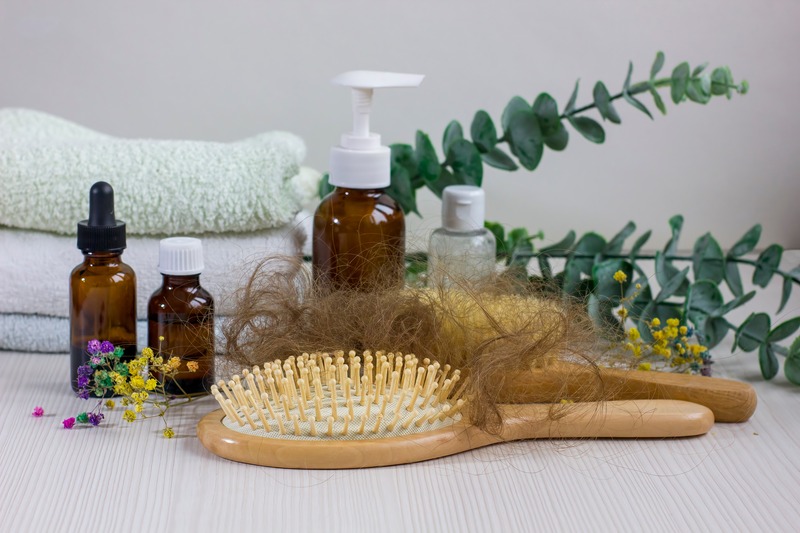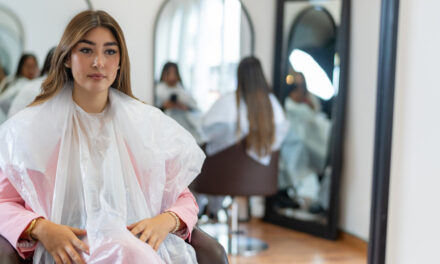
Dandruff is a common scalp condition that affects both men and women. It is characterized by dry, flaky skin on the scalp that can cause itching, irritation and redness. Hair loss may occur when the natural cycle of hair growth and renewal is disrupted due to dandruff-related inflammation or excessive scratching.
Understanding the connection between dandruff and hair loss helps you identify and address any underlying causes contributing to your condition. In addition, by understanding how dandruff can lead to hair loss, you can find effective solutions to prevent or reverse this common condition.
Fortunately, treatments are available to help keep dandruff and hair loss at bay.
Common Causes of Dandruff and Hair Loss
The following conditions can cause both :
Presence of Yeast and Bacteria
The yeast-like fungus, Malasseziaglobosa, plays a significant role in causing dandruff and hair loss. This fungus feeds on the scalp’s natural oils, which can lead to an overgrowth of the fungus and cause inflammation. An increase in skin oil also leads to increased bacteria growth which can irritate and inflame the scalp, leading to dandruff and hair loss.
Lichen planopilaris
A condition commonly found in women, it can lead to an itchy scalp with dry and flaky skin. Additionally, hair loss may occur in patches rather than gently shedding like dandruff does.
Unfortunately, over-the-counter treatments for dandruff will not be effective against this type of rash; however, the symptoms are similar enough that many mistake lichen planopilaris for regular scaling dandruff at first glance.
Folliculitis decalvans
A rare and harmful inflammatory disorder, this condition destroys hair follicles resulting in itchy red patches on one’s scalp. These sensations are often mistaken for dandruff due to their similarities.
Fungal infections
If you’re experiencing severe itching on your scalp, intense skin dryness and hair loss in clumps – it may be ringworm (Tinea capitis). Other fungal infections can also lead to similar dandruff-like symptoms. However, they are all treatable with antifungal medication. So don’t let these unwanted guests take over your head! Instead, take action against them today.
Seborrheic dermatitis
Although Seborrheic dermatitis can be present in any area of the human body, it is typically found on the scalp. An individual may notice a red or greyish scaly rash that causes itching; greasy patches are likely to occur.
Suppose this condition remains untreated for an extended period. In that case, hair follicles may experience deterioration due to scratching and itching aggressively at impacted areas. Therefore, prompt treatment should be sought out upon noticing symptoms.
Scalp psoriasis
Psoriasis is a form of autoimmune disorder that leads to the development of itchy, scaly patches on one’s scalp. Despite being different from dandruff, individuals may experience comparable symptoms. In addition, people may observe visible balding in areas where these patches exist.
Other Causes
There is no certainty that the two issues are interconnected in people with dandruff and hair loss. It’s possible to suffer from dandruff due to dry skin as well as a medical condition causing hair loss, such as:
- Scalp infections
- Alopecia areata is a debilitating disorder that results from the body’s immune system attacking its cells and tissues.
- Telogen effluvium is a form of temporary hair loss caused by infection, trauma, or overwhelming stress.
- Male or female pattern baldness. Both men and women are susceptible to a hormonal form of alopecia, an unfortunate condition resulting in hair loss.
- Inflammation or scarring of the scalp
How to Prevent Hair Loss from Dandruff

To effectively stop hair loss caused by dandruff, we must focus on reducing the itchiness of the scalp. This is key to eradicating dandruff-related hair fall and can be done by decreasing scratching and irritation.
Diet modifications
Modifying your diet and lifestyle is the primary step to preventing hair loss from dandruff. Eating a balanced diet rich in vitamins, minerals, and antioxidants can help reduce inflammation on the scalp that causes hair follicles to weaken.
Stress management techniques
Stress can also play a major role in exacerbating the symptoms of dandruff and hair loss. However, stress-reducing techniques such as yoga, meditation, or deep breathing can help reduce the severity of your condition.
Use medicated shampoos
Shampoos specifically designed for treating dandruff can help reduce the severity of your symptoms. This anti-dandruff shampoo contains active ingredients such as ketoconazole, selenium sulphide, zinc pyrithione, and salicylic acid that help treat dandruff and reduce inflammation.
Take supplement
Supplements containing biotin, zinc, and fish oils can help promote healthy hair growth. Biotin is especially beneficial for those suffering from dandruff-related hair loss since it helps strengthen the hair shafts and reduce shedding.
Proper Hair Care Routine
1. Avoid Overwashing
Overwashing can strip the scalp of its natural oils and make it more susceptible to dandruff. Instead, try washing your hair no more than twice a week with a gentle shampoo or even just once for those with an oily scalp.
2. Use Cold Water
Using cold water when washing your hair helps to reduce dryness on the scalp, as hot water can strip away its natural oils.
3. Go Light on Products
Using too much product on your hair can clog pores and prevent natural oil production that helps keep dandruff away. Instead, try light-on styling products such as gels and mousses when styling your hair.
4. Avoid Harsh Brushes
Using harsh brushes can irritate the scalp and cause further inflammation. Instead, use a soft brush when brushing your hair to avoid further irritating the scalp.
5. Don’t Scratch or Rub
Scratching and rubbing the head can increase dryness on the scalp, leading to further irritation and inflammation. If you suffer from an itchy scalp, use a medicated shampoo or topical product to reduce itching.
Home Remedies for Dandruff Hair Loss

In addition to the treatments above, some home remedies can help prevent dandruff-related hair loss.
1. Apple Cider Vinegar is a powerful antifungal and antibacterial agent that can help reduce scalp irritation and inflammation. Mix apple cider vinegar with one part water and massage it into your scalp for about five minutes. Leave the solution on for 10 minutes before washing it with a mild shampoo.
2. Coconut Oil Massage is packed with vitamins, antioxidants, and fatty acids to help treat dandruff while nourishing the scalp and preventing hair fall. Massage coconut oil onto your scalp for a few minutes before shampooing.
3. Aloe Vera has anti-inflammatory and antifungal properties, which can help reduce scalp irritation, dandruff, and hair fall. Applying aloe vera gel directly to the affected area may affect scalp health, and it is better to leave it on for about 20 minutes before rinsing it off with a mild shampoo.
4. Tea Tree Oil is a natural antifungal and anti-inflammatory agent that can help treat dandruff and reduce scalp irritation. Dilute tea tree oil in warm water and apply the solution directly to your scalp. Leave it on briefly before washing it off with mild shampoo.
5. Omega-3 Fatty Acids reduce inflammation that can cause hair loss. Increase your consumption of foods rich in omega-3 fatty acids, such as salmon, walnuts, and flaxseeds.
Conclusion
Dietary modifications, stress management techniques, and medicated shampoos can prevent hair loss caused by dandruff. In addition, proper hair care routine tips and home remedies such as apple cider vinegar, coconut oil massage, aloe vera, and tea tree oil can also help reduce the severity of your condition.
It is important to remember that completely curing dandruff is not always possible. Still, it can be effectively managed with proper management and taking the necessary steps to have a healthy scalp and hair. Consider visiting Vitamins Revive Store to find the best hair care products designed to help reduce dandruff-related hair loss.










